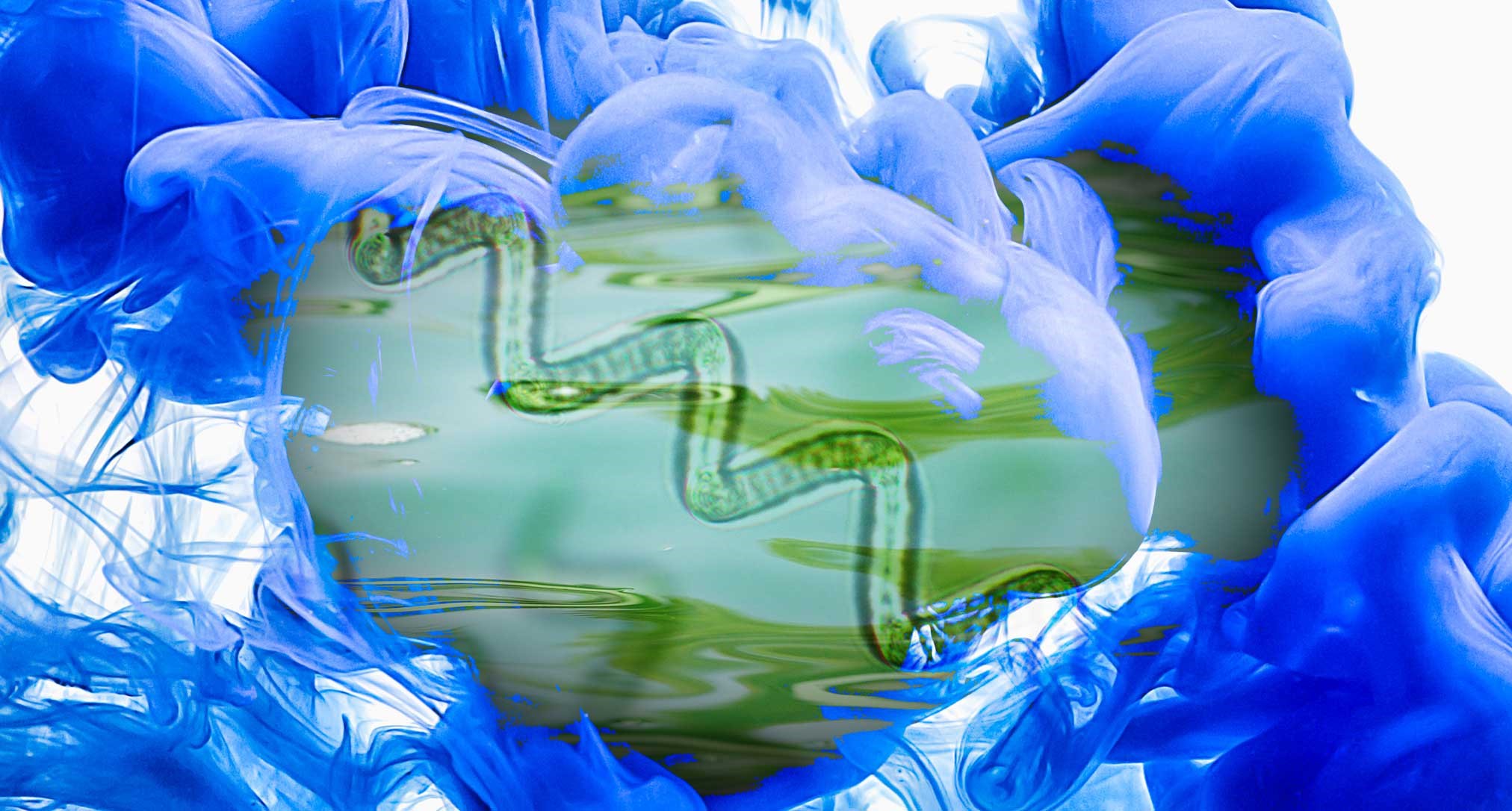
In the field of natural food supplements, spirulina and phycocyanin are increasingly popular. These two nutritional supplements are closely related, but they have significant differences. Spirulina contains phycocyanin in its membrane core, which catalyses energy so that the latter can survive. However, their properties and effects on the body differ. Spirulina is primarily a dietary supplement, while phycocyanin is used more for its specific therapeutic qualities.
Origin and composition
First of all, it should be mentioned that phycocyanin is extracted from the alga Arthrospira platensis, more commonly called spirulina. This micro-alga is mainly grown in brackish and shallow waters. It has a characteristic blue-green colour because of pigments such as chlorophyll (green) and phycocyanin (blue).
Origin and composition of Spirulina
Spirulina is a complete dietary supplement, rich in proteins, vitamins, minerals, essential fatty acids and antioxidants. It is composed of 55 to 70% protein, which makes it an excellent source of nutrients for vegetarians, for example. It also contains all the essential amino acids, as well as B-group vitamins, vitamin E, iron, calcium and magnesium.
Origin and composition of Phycocyanin
Phycocyanin is an extract of spirulina, which has specific properties. This molecule belongs to the family of photosynthetic pigments: phycobiliproteins. This cyan blue pigment is the component responsible for photosynthesis in spirulina. It is intense blue in colour, which is what helps to give spirulina alga its characteristic hue. The phycocyanin content varies according to the conditions in which the algae is cultivated and the methods used to extract it. Phycocyanin has many benefits for general health and well-being. PHYCOMANIA is the phycocyanin specialist in Europe.
Properties and benefits
Nutritional advantages of spirulina
As mentioned earlier, spirulina is rich in nutrients essential for the body to function properly. Its high protein content and full range of amino acids make it great ally for athletes and those need large amounts of protein.
The vitamins, minerals and antioxidants found in spirulina also help strengthen the immune system, fight oxidative stress and promote overall health.
The specific benefits of phycocyanin
Phycocyanin is known for its antioxidant properties which are superior to those of the other components of spirulina. It also has immunostimulant and detoxifying qualities, which make it a powerful remedy for treating a range of health problems.
For example, phycocyanin can be used to alleviate fatigue, stress, joint pain or to boost the immune system during the winter.
Forms and uses
Presentation of spirulina
Spirulina generally comes the form of powder, tablets or capsules. The powder can be mixed with juices, smoothies or food preparations, while tablets and capsules are more convenient for people who require specific doses.
Phycocyanin: 2 reference products
Phycocyanin is often marketed in the form of liquid or solid food supplements . The liquid version can be absorbed efficiently by the body.
PHYCOMANIA has formulated 2 exceptional dietary supplements based on phycocyanin:
- Food supplement 10K: the most powerful bio-compatible product in terms of phycocyanin concentration. This liquid food supplement is made of pure phycocyanin so full advantage can be taken of its antioxidant potential. This product is concentrated to a level of 10,000 mg of phycocyanin per litre.
- The Rhin Blue energy drink: a product formulated to fight fatigue and oxidation. The association of phycocyanin with acerola, and the caffeine-taurine combination, boosts energy during exercise, so athletes can calm down without becoming excessively agitated or suffering from nervous fatigue.
Summary on phycocyanin and spirulina
Phycocyanin is extracted from the alga Arthrospira platensis, more commonly known as spirulina that has various characteristics, properties and uses. While spirulina is a food supplement rich in essential nutrients, phycocyanin has specific therapeutic qualities related in particular to its antioxidant and anti-inflammatory properties.
So, the choice between these two food supplements depends mainly on each person’s specific needs, whether for overall global nutritional intake or for specific therapeutic support.

 The guardians of vitality : The Ultimate Synergy
The guardians of vitality : The Ultimate Synergy
 USER GUIDE FOR CHLORO B 5K: CHLOROPHYLL THE GREEN POWER OF SPIRULINA
USER GUIDE FOR CHLORO B 5K: CHLOROPHYLL THE GREEN POWER OF SPIRULINA
 How does the color of the product not determine the Phycocyanin concentration?
How does the color of the product not determine the Phycocyanin concentration?
 The benefits of phycocyanin
The benefits of phycocyanin
 Best Dietary Supplements: What are the Essential Dietary Supplements
Best Dietary Supplements: What are the Essential Dietary Supplements
 Spirulina Culture: How is Spirulina Cultivated?
Spirulina Culture: How is Spirulina Cultivated?
 The essential differences between spirulina and phycocyanin
The essential differences between spirulina and phycocyanin
 User Guide 10K Phycocyanin Dietary Supplement: The Bioactive Heart of Spirulina
User Guide 10K Phycocyanin Dietary Supplement: The Bioactive Heart of Spirulina
 Phycocyanin: A natural weapon against free radicals
Phycocyanin: A natural weapon against free radicals
 Phycocyanin and blood sugar: can phycocyanin help promote glycemic balance?
Phycocyanin and blood sugar: can phycocyanin help promote glycemic balance?
 The Benefits of Phycocyanin for Athletes to Enhance Performance
The Benefits of Phycocyanin for Athletes to Enhance Performance
 Boosting natural defenses: How does phycocyanin enhance your immune system?
Boosting natural defenses: How does phycocyanin enhance your immune system?
 Phycocyanin extraction: are all extraction methods as good as each other?
Phycocyanin extraction: are all extraction methods as good as each other?
 Understanding cyanobacteria: these multifaceted micro-organisms
Understanding cyanobacteria: these multifaceted micro-organisms
 Which is best? Phycocyanin in liquid, powder or tablet form?
Which is best? Phycocyanin in liquid, powder or tablet form?
 What is spirulina and what benefits does it have?
What is spirulina and what benefits does it have?
 What is the link between phycocyanin, physical recovery and sleep?
What is the link between phycocyanin, physical recovery and sleep?
 Better World Fund Cannes Festival 2022
Better World Fund Cannes Festival 2022